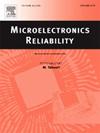Gate oxide lifetime modeling of vertical SiC-MOS under accelerated reverse bias (ARB)
IF 1.9
4区 工程技术
Q3 ENGINEERING, ELECTRICAL & ELECTRONIC
引用次数: 0
Abstract
Robustness under reverse bias is a pivotal reliability metric for MOS based SiC power devices. Accelerated reverse bias (ARB) stressing, typically involving multiple VDS stress values beyond the rated drain bias but below the avalanche voltage, is deemed optimal for assessing the device lifetime in the blocking mode. However, generating adequate failure statistics within a feasible timeframe during ARB tests can be arduous, particularly for devices engineered to undergo avalanche breakdown at lower drain voltages than those necessary to induce gate oxide wear-out failures within a reasonable time. This paper presents an innovative, streamlined alternative modeling approach, where qualification-like high temperature reverse bias (HTRB) or ARB test at a singular stress voltage for a suitable stress duration can be utilized to predict gate oxide lifetimes under blocking conditions, obviating the need for any prolonged testing.
加速反向偏压(ARB)下垂直SiC-MOS栅氧化寿命建模
反向偏置下的鲁棒性是基于MOS的SiC功率器件的关键可靠性指标。加速反向偏置(ARB)应力,通常涉及多个VDS应力值,超过额定漏极偏置,但低于雪崩电压,被认为是评估阻塞模式下设备寿命的最佳选择。然而,在可行的时间范围内生成足够的故障统计数据在ARB测试期间可能是艰巨的,特别是对于设计为在较低的漏极电压下经历雪崩击穿的设备,而不是在合理的时间内引起栅极氧化物磨损故障所必需的电压。本文提出了一种创新的、流线型的替代建模方法,在合适的应力持续时间下,在单一应力电压下进行高温反向偏置(HTRB)或ARB测试,可以用来预测阻塞条件下栅极氧化物的寿命,从而避免了任何延长测试的需要。
本文章由计算机程序翻译,如有差异,请以英文原文为准。
求助全文
约1分钟内获得全文
求助全文
来源期刊

Microelectronics Reliability
工程技术-工程:电子与电气
CiteScore
3.30
自引率
12.50%
发文量
342
审稿时长
68 days
期刊介绍:
Microelectronics Reliability, is dedicated to disseminating the latest research results and related information on the reliability of microelectronic devices, circuits and systems, from materials, process and manufacturing, to design, testing and operation. The coverage of the journal includes the following topics: measurement, understanding and analysis; evaluation and prediction; modelling and simulation; methodologies and mitigation. Papers which combine reliability with other important areas of microelectronics engineering, such as design, fabrication, integration, testing, and field operation will also be welcome, and practical papers reporting case studies in the field and specific application domains are particularly encouraged.
Most accepted papers will be published as Research Papers, describing significant advances and completed work. Papers reviewing important developing topics of general interest may be accepted for publication as Review Papers. Urgent communications of a more preliminary nature and short reports on completed practical work of current interest may be considered for publication as Research Notes. All contributions are subject to peer review by leading experts in the field.
 求助内容:
求助内容: 应助结果提醒方式:
应助结果提醒方式:


